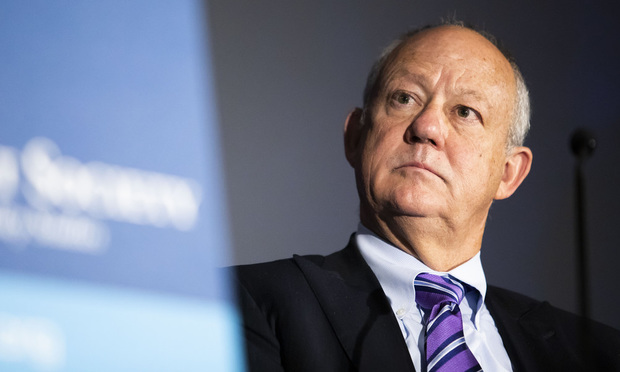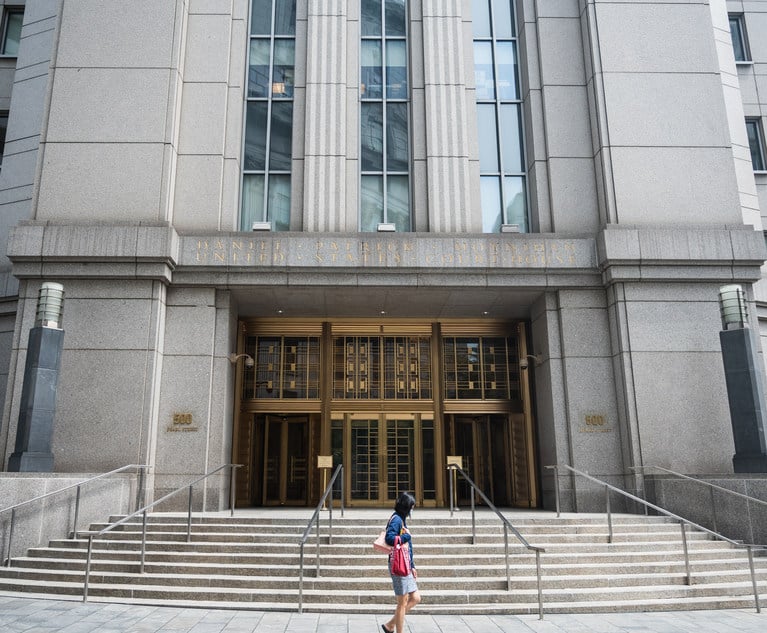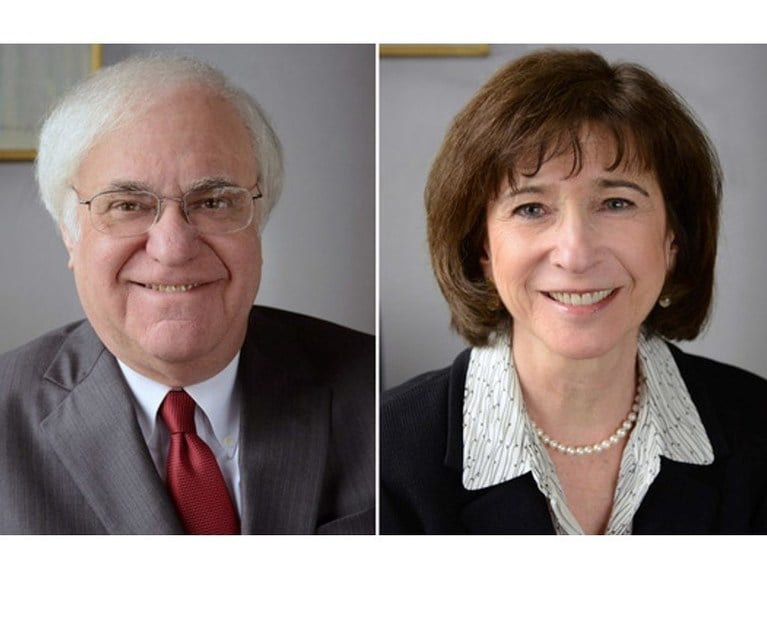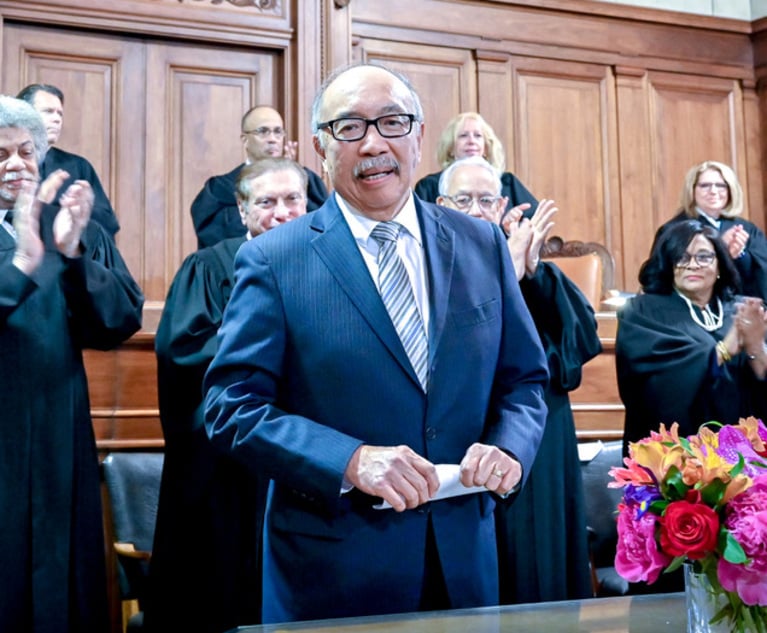Appeals Challenge Dismissal of Kavanaugh Ethics Complaints
One of the appeals was filed by a New York lawyer, Jeremy Bates, who serves as a member of the committee on professional ethics of the New York City Bar Association.
January 31, 2019 at 12:14 PM
8 minute read
The original version of this story was published on National Law Journal
Recently filed appeals challenging the dismissal of 83 misconduct complaints against now-Justice Brett Kavanaugh raise questions about whether the resolution was proper, how and by whom the appeals will be reviewed, and whether transparency will prevail going forward.
Kavanaugh, formerly a judge on the U.S. Court of Appeals for the D.C. Circuit, faced allegations of judicial misconduct over statements he made at his confirmation proceedings for the U.S. Supreme Court. The complaints alleged, among other things, that Kavanaugh displayed improper judicial temperament and made false statements.
The Tenth Circuit judicial council, in a Dec. 18 order issued by Chief Judge Timothy Tymkovich, concluded it lacked the power to consider the complaints against Kavanaugh. The council, despite calling the claims “serious,” dismissed them because an intervening event—Kavanaugh's elevation to the Supreme Court—made him no longer a “judge” covered by the Judicial Conduct and Disability Act.
At least two people who brought ethics complaints against Kavanaugh for his Sept. 27 testimony before the Senate Judiciary Committee have said they filed appeals challenging the council's order dismissing their claims. One of the appeals was filed by a New York lawyer, Jeremy Bates, who serves as a member of the committee on professional ethics of the New York City Bar Association, and the other was by Paul Horvitz, a financial editor and Massachusetts resident who is not a lawyer.
>> The Bates appeal contends the judicial council order violates the “time-of-filing” rule, which holds that a court's jurisdiction depends on “the state of things at the time of the action brought” and Kavanaugh was a “judge” when the complaint was filed. The order also is “unlawful, inequitable and wrong on policy grounds” for reasons stated in the appeal.
>> The Horvitz appeal contends the judicial council should be disqualified from acting on the appeal because it had earlier ruled on the complaints themselves. The appeal petition argues the council misinterpreted “intervening event” and erroneously relied on a “novel and excessively generous” interpretation of “covered judge” to reach its decision.
“This is a very interesting situation and one not obviously contemplated by the rules,” said federal court scholar Arthur Hellman of the University of Pittsburgh School of Law.
The Tenth Circuit's circuit executive's office declined to confirm the existence of any appeal petitions.
The central focus of many of the complaints against Kavanaugh were statements he made Sept. 27 at his confirmation hearing. A California professor named Christine Blasey Ford had testified that Kavanaugh, then a high school student in suburban Maryland, sexually assaulted her. Kavanaugh denounced the claim, leveling a partisan diatribe against Senate Judiciary Democrats and accusing them of a “search and destroy” mission.
Kavanaugh subsequently retreated from some of his remarks, saying “I said a few things I should not have said.” Kavanaugh in October vowed he would be an independent justice, arriving at the high court with “no bitterness” about his confirmation proceeding.
Kavanaugh declined to comment on the appeals, according to the Supreme Court's public information office.
A question of process
Complaints against Kavanaugh were first filed with the D.C. Circuit, where Kavanaugh had served since 2006. Chief Justice John Roberts Jr. transferred the claims to the Tenth Circuit's chief judge for review.
“The chief judge may conclude a complaint proceeding in whole or in part upon determining that intervening events render some or all of the allegations moot or make remedial action impossible,” according to the rules. One “intervening event” might be a judge's resignation from the bench.
In Kavanaugh's case, he was confirmed to the Supreme Court, which does not have its own ethics code and does not formally follow the one that lower court judges must follow. Judicial conduct rules provide the lanes in which conduct on the bench, and off, is measured. The rules focus on, among other things, judicial temperament and conflicts of interest.
Just who or which body should handle appeals of Kavanaugh complaints is the procedural problem raised in Horvitz's appeal, Hellman said. The question was created, he said, when the ordinary two-step process for handling complaints was “telescoped” into one step by the judicial council assuming the role assigned to the chief judge.
In the usual course under the rules, a complaint is filed with the circuit's chief judge—or the chief judge initiates the complaint process—who then takes some action on it. An appeal of the chief judge's disposition can be made to the circuit's judicial council, Hellman said. The rules also permit further appeal—in certain circumstances—to the Judicial Conference's Committee on Judicial Conduct and Disability.
Tymkovich could refer the appeal to the Judicial Conference committee, or that committee may take any appeals on its own initiative.
 Judge Timothy M. Tymkovich at a Federalist Society discussion in 2018. Photo: Diego M. Radzinschi/NLJ
Judge Timothy M. Tymkovich at a Federalist Society discussion in 2018. Photo: Diego M. Radzinschi/NLJA spokesman for the Administrative Office of the U.S. Courts said he could neither confirm nor deny that any appeal of the Kavanaugh order has reached the Judicial Conference's judicial conduct and disability committee, headed by Judge Anthony Scirica of the Third Circuit.
Judiciary rules permit disclosure of the existence of a proceeding when necessary or appropriate to maintain public confidence, Hellman said. Tymkovich's order dismissing the Kavanaugh complaints was released, in addition to redacted copies of the allegations themselves.
Legal ethics scholar Stephen Gillers of New York University Law School said he sees “no problem” with the Tenth Circuit judicial council itself reviewing appeals of the order dismissing the Kavanaugh complaints.
“In the world of lawyers and judges, asking the judge or panel that decided a case to reconsider its decision is not uncommon,” Gillers said. “There are rules allowing that. In the real world, the world everyone else inhabits, it seems odd to learn your objection to the reasoning of a judicial panel will be decided by the judicial panel that rejected your request in the first place.”
Still, even if an appeal is rejected by the judicial council, he added, there is recourse to the Judicial Conference committee.
Judicial ethics scholar Charles Geyh of Indiana University Maurer School of Law predicted that no appeal of the council's order will survive.
Critical to both appeals is the argument that the judicial council wrongly held that the “intervening event” of Kavanaugh's elevation rendered consideration of the complaints' merits “no longer necessary” under the Judicial Conduct and Disability Act.
Geyh said he sees no “escape from the language of the act, which ended the circuit council's authority to act when Kavanaugh ceased to be a judge subject to discipline.”
Whether promotion to the Supreme Court should eliminate jurisdiction is a “deep policy issue here,” Gillers said. “Maybe the authority the council cited in its order is correct, but then the next question is maybe it should be changed. Not that this will happen often. This justice is being accused of conduct that occurred before he was a justice.”
Geyh and Hellman agree that Congress, in enacting the Judicial Conduct and Disability Act, probably did not imagine that any judge facing misconduct complaints could escape accountability because of a promotion to the Supreme Court.
“And I regard that result as unfortunate because those unresolved issues will hang over the court throughout Justice Kavanaugh's tenure like a cloud, to the detriment of public confidence in him and the Court,” Geyh said.
Read more:
Grassley Aide Mike Davis Reflects on Combative Kavanaugh Confirmation
Judicial Ethics Panel Dismisses Brett Kavanaugh Misconduct Complaints
Ex-Thomas Clerk Will Be Lindsey Graham's Chief Counsel for Nominations
Why Dianne Feinstein's Lead Counsel for Nominations Isn't Returning to Big Law
Michael Bromwich Looks Back—and Ahead—After Kavanaugh-Ford Hearings
This content has been archived. It is available through our partners, LexisNexis® and Bloomberg Law.
To view this content, please continue to their sites.
Not a Lexis Subscriber?
Subscribe Now
Not a Bloomberg Law Subscriber?
Subscribe Now
NOT FOR REPRINT
© 2025 ALM Global, LLC, All Rights Reserved. Request academic re-use from www.copyright.com. All other uses, submit a request to [email protected]. For more information visit Asset & Logo Licensing.
You Might Like
View All
Justice Marguerite Grays Elevated to Co-Chair Panel That Advises on Commercial Division

Ex-SDNY Clerk Can't Convince 2nd Circuit That Bribery Sentence Was Improper
3 minute read

Time for Change: Addressing Underrepresentation of Asian American Judges in the New York State Judiciary
7 minute readTrending Stories
Who Got The Work
J. Brugh Lower of Gibbons has entered an appearance for industrial equipment supplier Devco Corporation in a pending trademark infringement lawsuit. The suit, accusing the defendant of selling knock-off Graco products, was filed Dec. 18 in New Jersey District Court by Rivkin Radler on behalf of Graco Inc. and Graco Minnesota. The case, assigned to U.S. District Judge Zahid N. Quraishi, is 3:24-cv-11294, Graco Inc. et al v. Devco Corporation.
Who Got The Work
Rebecca Maller-Stein and Kent A. Yalowitz of Arnold & Porter Kaye Scholer have entered their appearances for Hanaco Venture Capital and its executives, Lior Prosor and David Frankel, in a pending securities lawsuit. The action, filed on Dec. 24 in New York Southern District Court by Zell, Aron & Co. on behalf of Goldeneye Advisors, accuses the defendants of negligently and fraudulently managing the plaintiff's $1 million investment. The case, assigned to U.S. District Judge Vernon S. Broderick, is 1:24-cv-09918, Goldeneye Advisors, LLC v. Hanaco Venture Capital, Ltd. et al.
Who Got The Work
Attorneys from A&O Shearman has stepped in as defense counsel for Toronto-Dominion Bank and other defendants in a pending securities class action. The suit, filed Dec. 11 in New York Southern District Court by Bleichmar Fonti & Auld, accuses the defendants of concealing the bank's 'pervasive' deficiencies in regards to its compliance with the Bank Secrecy Act and the quality of its anti-money laundering controls. The case, assigned to U.S. District Judge Arun Subramanian, is 1:24-cv-09445, Gonzalez v. The Toronto-Dominion Bank et al.
Who Got The Work
Crown Castle International, a Pennsylvania company providing shared communications infrastructure, has turned to Luke D. Wolf of Gordon Rees Scully Mansukhani to fend off a pending breach-of-contract lawsuit. The court action, filed Nov. 25 in Michigan Eastern District Court by Hooper Hathaway PC on behalf of The Town Residences LLC, accuses Crown Castle of failing to transfer approximately $30,000 in utility payments from T-Mobile in breach of a roof-top lease and assignment agreement. The case, assigned to U.S. District Judge Susan K. Declercq, is 2:24-cv-13131, The Town Residences LLC v. T-Mobile US, Inc. et al.
Who Got The Work
Wilfred P. Coronato and Daniel M. Schwartz of McCarter & English have stepped in as defense counsel to Electrolux Home Products Inc. in a pending product liability lawsuit. The court action, filed Nov. 26 in New York Eastern District Court by Poulos Lopiccolo PC and Nagel Rice LLP on behalf of David Stern, alleges that the defendant's refrigerators’ drawers and shelving repeatedly break and fall apart within months after purchase. The case, assigned to U.S. District Judge Joan M. Azrack, is 2:24-cv-08204, Stern v. Electrolux Home Products, Inc.
Featured Firms
Law Offices of Gary Martin Hays & Associates, P.C.
(470) 294-1674
Law Offices of Mark E. Salomone
(857) 444-6468
Smith & Hassler
(713) 739-1250






